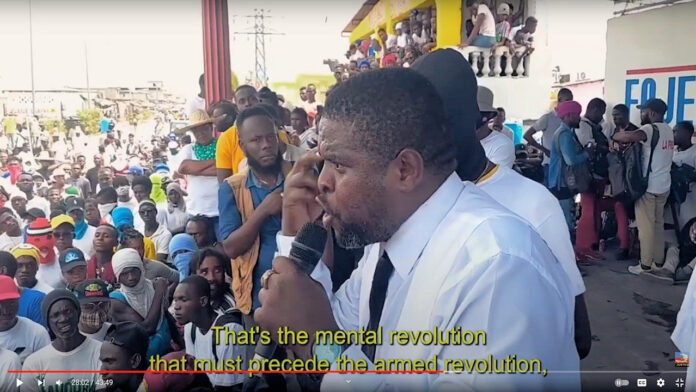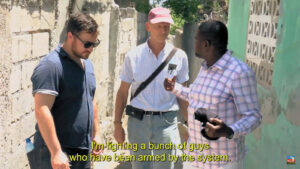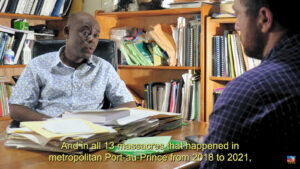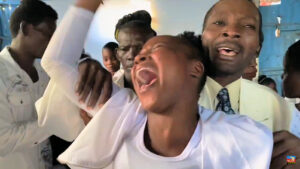
(Français)
The background and deep context news consumers require to fully understand what is going on in the world and Canada’s role in it are frequently left out of mainstream reporting.
Case in point is establishment news media’s ongoing whitewash of Canada’s role in Haiti.
This 2004 CBC headline is still posted on cbcnews.ca: – Aristide leaves office, flees Haiti – the article goes on to say: “Jean-Bertrand Aristide resigned as president of Haiti and left the country Sunday, bowing to pressure from rebels who said they would not storm the capital if he left.”
CTV’s update almost 20 years later in a 2021 story: “Reelected in 2000, he (Aristide) was ousted four years later in a rebellion led by opponents with ties to the elite and the old Duvalierist regime.”

Both accounts leave unreported Canada’s Machiavellian role in the ousting of democratically elected Haitian president Jean-Bertrand Aristide.
This l’Actualité banner headline (03/15/03) contradicts the English press: “Haiti placed in trusteeship by the UN? – Aristide must be overthrown. And it is not the Haitian opposition that is calling for it, but a collection of countries brought together at the initiative of Canada!”
Yves Engler reported that a Liberal insider in Jean Chrétien’s government had leaked to l’Actualité reporter Michel Vastel details of a meeting of Canadian, French, and U.S. government officials, along with representatives from the Organization of American States (OAS), who came together to strategize over regime change in Haiti. No Haitian representative was invited to the secret gathering designated “The Ottawa Initiative on Haiti,” where “Aristide must go” was the theme and a “Kosovo-model” UN trusteeship over Haiti was on the table.
Vastel’s 2003 story remains posted on l’Actualité’s news site and additional information on the Ottawa Initiative released to online news outlet The Breach can be found in the public record. Still, establishment journalists continue to ignore the story, and Canadians who get their news from the most trusted brands remain no wiser about the true role Canada played and continues to play in Haiti’s affairs, acting in concert with U.S. interests and the OAS.
“Another Vision: Inside Haiti’s Uprising” is a must-watch resource available on YouTube…
At the time of this writing Haitian society is spiraling into chaos. Street demonstrations against foreign interventions in Haitian affairs have turned into a virtual insurrection. Protesters carrying symbolic coffins emblazoned with the flags of Canada, France, and the U.S. make for dramatic front-page imagery but receive no meaningful editorial scrutiny in the mainstream Canadian press.
Allan Woods, Montreal-based staff reporter for the Star, puts forward a version of the current state of affairs in Haiti in a Mar. 18 story: “The July 2021 assassination of President Jovenel Moïse set off a wave of insecurity that has inundated the island nation. Powerful gangs have been battling for control of the country and the Haitian National Police, lacking personnel and equipment, have been powerless to uphold the law.”
A December 2021 CBC subheadline reads: “Some Haitians say de facto control by foreign ambassadors, local allies brought hunger and gang rule.” CBC Latin Affairs specialist Evan Dyer acknowledges foreign intervention and a corrupt ruling class as root causes of a perpetual humanitarian crisis in Haiti.
Quoting Haitian activist Monique Clesca, a member of the Commission for a Haitian Solution to the Crisis, Dyer reports that the embassies “push a supposed stability that is filled with corruption and impunity. We are where we are because of the support of the Core Group, led by the United States, and Canada also plays a prominent role.”
As with much of Canadian reporting on Haiti, Dyer’s story leaves out any meaningful explanation of Canada’s “prominent role” in Haiti’s “supposed stability.” Canada’s record as perpetual foreign intervener, regime change backer, and supporter of corrupt Haitian leaderships is blurred out.
A Dec. 3, 2022 Toronto Star op-ed titled Don’t believe the media hype: Canada is no friend of Haiti is an uncommon example of historical context on Haiti making its way into the mainstream. Academics Karine Coen-Sanchez, a first-generation Haitian and PhD candidate at the University of Ottawa, and Kevin Edmonds, assistant professor in Caribbean studies at the University of Toronto, write:
“The dangerous lack of context in reporting on Haiti is positioning Canada as a saviour, when there is “instead a complex history of self-serving, condescending, and imperialist actions that have neutralized popular political movements, undermined the capacity of the state, and supported a kleptocratic and gang affiliated PHTK party (Parti Haïtien Tèt Kale).”
One distinguishing feature of mainstream reporting from “troubled parts” of the world in general, including Haiti coverage, is that, with notable exceptions, too few establishment reporters spend significant time with grassroots communities for a comprehensive street level perspective of events.
The nearly three hours of documentary journalism is part gritty verité that doesn’t look away, and part media analysis…
Independent news outlets Haïti Liberté and Uncaptured Media present a more nuanced narrative on Haiti’s present-day troubles than the mainstream press. With correspondents seeking out voices from behind the barricades, from deep inside impoverished neighborhoods, what emerges are layered accounts about gangs and violence and desperate lives that are not as homogenous as the establishment press make them out to be.
In a Jan. 31, 2023, Associated Press story headlined “In Haiti gangs take control as democracy withers,” Megan Janetsky and Pierre Richard Luxama point to Jimmy Cherizier, Port-au-Prince community leader and former cop, as the principal violent force inciting the gang wars:
“Internationally, he’s known as Haiti’s most powerful and feared gang leader, sanctioned by the United Nations for ‘serious human rights abuses,’ and the man behind a fuel blockade that brought the Caribbean nation to its knees late last year.”
Evan Dyer reporting for the CBC: “Gang leaders like Cherizier are no longer content merely to provide muscle and coerce votes for Haiti’s rulers; he now has aspirations of ruling Haiti himself.” Dyer’s assertion betrays his remoteness from actual events but manages with one careless claim to erase the revolutionary aspirations of ordinary Haitians.
Kim Ives and Uncaptured Media journalist Dan Cohen’s documentary, Another Vision: Inside Haiti’s Uprising (2022) is a must-watch resource available on YouTube that “tells the story of Jimmy ‘Barbecue’ Cherizier and the Revolutionary Forces of the G9 Family and Allies, the armed neighborhood federation in the crosshairs of the U.S. empire.”
Cherizier formally introduced his anti-violence G9 coalition in a 2020 YouTube video:
“The G9 and allies is a group of young men and women who have united to say there will never be again be kidnapping in Wharf Jeremie, there will never be robberies, hijacking of people’s rice trucks, or rapes. We in the ghetto have never benefitted from anything. G9 Family and Allies is an organization of nationalists focused on the country and the ghettoes who united to dismantle a number of vagabonds and gangs that politicians use to harm the ghettoes each time they seek to take power.”
According to Ives and Cohen’s documentary, Cherizier is the first populist leader since Aristide who has managed “to shine a light on the pain of the abandoned underclass.”
The nearly three hours of documentary journalism, is part gritty verité that doesn’t look away, and part media analysis that “dissects Western media’s disinformation offensive” against Cherizier. Another Vision is a powerful re-education experience, if all you’ve been exposed to is mainstream coverage of Haitian “gang wars.”

Canadian mainstream journalism around Haitian affairs relies heavily on official narratives provided by Western government officials, human rights organizations and think tanks.
In November 2017, when still an officer with Haitian National Police (HNP), Cherizier took part in a UN supervised police operation to round up criminals in the Grand Ravine neighborhood of Port au Prince. The operation went wrong, a gun battle ensued, two cops and nine civilians were killed including suspected gang members.
According to Cohen, “The portrayal of this event became the opening salvo in an information war against Cherizier.”
Haiti’s National Human Rights Defense Network (RNDDH) issued a report that civilians had been summarily executed by police during the raid. An Intercept article relying on RNDDH claims called the operation a massacre. According to Cherizier, there were no summary executions by the police, people were caught in crossfire between police and gang members. “These falsehoods were fabricated by RNDDH to pressure the police so they could find an issue to bring against the government at the time.” The film explains how the RNDDH report panicked police leadership, who turned on Cherizier and accused him of conducting a rogue operation. He was fired after 14 years on the force.
When citing think tanks or sources connected to human rights organizations, the establishment press typically does not report that many such groups, including RNDDH, are funded by the National Endowment for Democracy (NED). The NED is a known propaganda arm of the U.S. government that carries out destabilization campaigns in foreign countries. In the documentary Cohen quotes Allen Weinstein, NED co-founder under Ronald Reagan: “A lot of what we do today was done 25 years ago covertly by the CIA.”
RNDDH has a history of political machinations on behalf of its foreign sponsors including, under a previous incarnation (National Coalition for Haitian Rights [NCHR]), running a disinformation campaign in the lead up to the 2004 coup against President Jean-Bertrand Aristide.
The documentary’s opening unpacks the history of the Caribbean nation’s struggle from slavery to independence: “Today Haiti is a neocolony of the US, France and Canada… …Gang violence is a continuation of a 200-year class struggle against exploitation and oppression.”
But the power in Ives and Cohen’s documentary is not in the narration, it’s in the images of the squalor and the sounds of determined defiance. Cherizier tours the film crew through some of the most desperate corners of his lower Delmas neighborhood.
Narrator:
“Children play near sewage-soaked canals, cleaning them is an endless task…mountains of stinking garbage line the streets and alley ways festering for months on end without collection. Many burn around the clock, picked over by beggars and dogs. But in Cherizier’s lower Delmas the situation is different.”
The documentary shows the results of Cherizier’s attempts to unite armed groups against criminal gangs and kidnappers. The former HNP officer amplifies to the camera “underlying issues that give rise to crime, poverty and inequality and a bourgeoisie that pays and arms criminals to do its dirty work.”
Cherizier:
“This is part of Delmas 4,6,8 Another Vision. Another Vision means the state doesn’t do anything for us in this place. If we relied on the state or the government our neighborhood would never be clean.”
Cherizier explains how funds raised from people in the Haitian diaspora, who once lived in lower Delmas neighborhoods, are used to buy street cleaning equipment. He points to a small pickup truck. “With this vehicle we go by people’s houses every Monday Wednesday and Friday to collect their garbage.” In addition to street cleaning, the G9 provides low-cost water for residents, youth recreation activities, and community enrichment programs from cooking hot meals to dance classes and concerts.
Narrator:
“On Jun. 17, 2021, the Haitian National Police’s company for the maintenance of order supported by irregulars from the armed groups from Belair, Ruelle Maillart, and Rue TireMasse [rival neighborhoods] attacked Delmas 4 and 6 [Cherizier’s neighborhoods]. Over the span of a few hours they burned and bulldozed over 60 houses and at least one school. Witnesses told us 20 people died in the attack.”
Cherizier leads Cohen and Ives on a tour of the damage:
“What you see there was done by policemen. With armed groups from Ruelle Maillart, Belair, and Rue Tiremasse. They were using the policemen to bulldoze and destroy these houses. You’ll never see a human rights group talk about the massacre in Delmas 6. You’ll never hear human rights groups talk about people in Delmas 6 who were killed. You’ll never hear human rights groups talk about Delmas 6 people made homeless.”

When challenged by Cohen, RNDDH director Pierre Espérance claims his organization is too strapped for resources “to report everything.”
The documentary effectively debunks massacre and rape allegations against Cherizier, but doesn’t hold back on showcasing the revolutionary fervor of the movement he started.
Cherizier acknowledges that the criminal gangs opposing him are victims of the system just like he is:
“Who is our enemy? It’s not those armed guys from Ruelle Maillart who are our real enemies. It’s not the armed guys in Belair, Rue Tiremasse, and Grand Ravine who are my enemies. We have a society where 5% of the population control 85% of the country’s wealth. We have 60% of individuals who are under 35 years old. 70% of our people are jobless. That’s the reality of the country. Today I dare to attack the system. That’s why those guys want to destroy me. We want a revolution to redistribute the country’s wealth for all Haitians to have something.”
An animated female supporter concurs:
“We have to claim what is rightfully ours. When I say rightfully, I mean the right to healthcare, education, and housing. We have a right to all those things to live like human beings. The same way people in Pétionville live, the same way people in the upper Delmas live. We have to go to school too. They’re not any more intelligent than us. But why are they always marginalizing us? Today we say another Haiti is possible. Today we say about this system, it’s time to become conscious. We must become conscious to see the state people are living in. Come to Cité Soleil to see how we live.”
In a Haïti Liberté report, Kim Ives recently speculated on renewed fighting between downtown Port-au-Prince neighborhoods, after months of relative peace: “Some analysts question whether the confrontations now raging haven’t been engineered to provide a pretext for Washington and Ottawa to launch their third foreign military occupation of Haiti in the past three decades.”
Indeed, on the eve of president Joe Biden’s Ottawa visit, Allan Woods wonders in the Star whether “Canada will agree to lead an international security force to bring order to the country by reinforcing Haiti’s understaffed and ill-equipped national police.”
The Canadian establishment press has abandoned accountability journalism when it comes to reporting on Haiti. Challenges to government decisions for military intervention in Haiti and questions to Canadian policy-makers to account for a history of interference in Haitian affairs continue to go unexplored in Canadian news coverage and analyses.
Canadian news consumers who exclusively read, watch, and listen to mainstream news remain underinformed about the dishonorable history of Canada’s interference in Haiti.
This article is extracted from a longer one entitled “Haiti, Syria, and beyond: How Canada’s Fourth Estate fails to serve the public’s right to know,” published by The Canada Files on Mar. 23, 2023. Peter Biesterfeld is a freelance writer, independent documentary maker, and educator based in Toronto. He writes and makes films about social justice and mediawatch issues. He has written for NOW magazine, Common Ground, The Dominion, and Videomaker.













[…] Haitian Struggles for Freedom Misrepresented Haiti Liberte […]